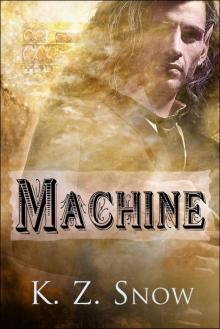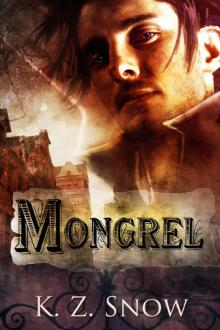- Home
- K. Z. Snow
Xylophone
Xylophone Read online
Chapter One
PEPPER JACK dropped nimbly to his knees, legs spread, in front of the customer who’d motioned him over. For a moment, the man’s face disappeared within a coronal flare of gold and purple light.
“Check the goods!” someone yelled from the audience.
They were boisterous tonight.
“Yeah,” the customer said, looking into Dare’s eyes, “show me those cookies. C’mon. Gimme a sample.” The man reached for Pepper’s crotch. With practiced speed and precision, Pepper gracefully blocked the move with a palm to the man’s wrist. Those customers closest to the stage made their feelings known by howling, clapping, laughing, or jeering. Pepper smiled at the grabber, slowly waved a forefinger, and shook his head. The denial was subtle but emphatic.
“Don’t you know,” he crooned, leaning forward, “the best things in life aren’t free?”
Just as a marbled cloud of scent—perspiration and cologne, alcohol and fruit—snaked up Pepper Jack’s nostrils like a psychotropic vapor, the spotlights’ glare shifted and the customer’s face took shape, receding hairline to jutting, bearded chin. Poor guy didn’t even have a chance to request a personal dance, a pricey bit of special entertainment. He didn’t have a chance, because the dancer’s perceptional framework had completely altered.
Pepper Jack was Daren Boothe again, and many years younger. Although the face Dare looked at was below him rather than above him—above was where it should have been, where it had always been—it was Howard Pankin’s face. Dare’s breath caught. The club’s interior drained away into shadow. The loud music and raucous voices paled to white noise. All that remained was a soul-shaking impulse to flee.
Of course the man wasn’t Howard Pankin. Not unless there was a necromancer in the audience. Still, Dare bounced to his feet to get away, to become Pepper Jack again and seek refuge at the pole around which he’d earlier been twined. He didn’t ripple against it this time. He didn’t suspend himself upside down while scissoring his legs. The Pankin lookalike had effectively ended his act.
So Pepper swung into his finale. Rather than encouraging more profitable attention, he performed a perfect, prolonged Dying Swan. Hooking the pole with one leg, he arched into a deep, backward dip. Then he rose, abs clenching with the effort, and gripped the pole with one hand. Eyes closed, he spun slowly around his pivot, his silent, sterile, steadfast partner. It accepted what he gave, and when and how, and made no demands.
“Adieu, farewell,” he whispered, “auf Wiedersehen, good-bye.”
After two turns he let his free arm, which he’d fluidly extended, drift close to his body; he let his fingers glide over his inner thigh and up the gullies framing the mound at his crotch. His hand lingered there for a moment, asserting possession, before moving higher, ever higher, until he was caressing his chest, then his neck, then his face. Still in a slow-motion twirl, he bent his supporting leg to drop himself languidly to the stage. When he was seated, he crossed his arms over his chest in a demure X and lowered his head.
The lights briefly dimmed. A lone, glowing disc of blue highlighted Pepper Jack’s form.
“I got a pole for you,” a deep voice called from the back of the house. Approval followed on a smattering of snickers and applause.
Pepper Jack got to his feet and executed his signature bow-curtsy before leaving the large, half-moon stage.
Howard Pankin.
Jesus. What a shit-rotten way to end the night.
DARE sometimes wondered, as he freed his ribcage from the throttling grip of a corset, just how much his fellow entertainers at the Sugar Bowl were hiding behind their stage personas. He glanced around the light-washed dressing room, briefly taking in the shrill laughter and snark, the parade of extravagant wigs, the galactic glitter of gowns. These queens seemed carefree enough, in spite of their nonstop bitching and petty rivalries, but Dare often got the impression drag was but a frilly fortress.
On certain nights, he sensed there was something softer than chiffon beneath Juci’s superheroine costumes, something even more easily torn. He sensed a true and terrifying vulnerability in the made-up doe eyes of Angelique.
Maybe he was only projecting. Not every gay man had an Incident in his past or a Situation in his present. Not everyone had secret Issues.
In his mind, Dare always capitalized these strenuously vague, neutral words. He was willing to give them weight but not specificity. He didn’t want to think about Incidents and Situations and Issues in detailed terms.
Crème Freshe snapped Dare’s line of thought—an unwitting act of mercy. “Why don’t you go all-girl or all-boy?” she asked. Her pale eyebrows, shaped and feathered to perfection, drew together as she gave Dare the once-over. Tonight was Crème’s first night at the Sugar Bowl.
“Androgyny’s in,” Dare said in a matter-of-fact way. He unclipped his stockings from his garter belt and, lifting each shaved leg in turn, carefully rolled them off.
Dare didn’t have a drag act. Not precisely. Instead, he combined dance with gymnastics—around poles, in cages, on tables and on laps—in a style that was balletic, athletic, and exotic all at once. His wardrobe included an array of boned waist-cinchers with garter straps, tie-backed corsets, lace-up and suspender pantyhose, fishnet body stockings, short, clingy mini-slips, and bustiers with matching garter belts. But there wasn’t a single wig or gaff or breast form among his costume pieces.
His was a confuse-the-eye act. The sinuous, long-legged, wild-haired Pepper Jack at first appeared to be a woman, or maybe another queen. But he was neither. The bare ass he displayed was obviously a young man’s ass. The chest, with its fine spray of hair between low mounds of pectoral muscle, was obviously a man’s chest. And the crotch within the skimpy silk or leather underwear was very obviously a man’s crotch.
Dare extracted the bills that fanned above and around his black lace, pouch-exaggerating panties. A few note-bearing napkins were tucked among them.
“Wow. You made out tonight,” Crème said, enviously eyeing the wad.
After tossing the notes to one side, Dare laid the money in front of him on his dressing table. “Like I said, androgyny is in.” He began taming his teased hair—somewhat long, with a loose, natural curl—back into its normal state. Thanks to an array of wear ’n’ wash colorants, his hair always matched his costumes. Tonight he’d streaked the gleaming mahogany of its base color with reddish-gold.
Crème, who was gradually becoming Zachary again, peered at one of the napkin messages. “Looks like you have female admirers too.”
Dare shrugged as he yanked a few cosmetic wipes from a plastic container. “Comes with the territory.”
“So, are you bi?”
Off came the subtly applied makeup that highlighted Dare’s eyes, cheekbones, and lips, further blurring his gender. As he tossed the color-smeared towelettes into a wastebasket, he was tempted to answer I’m whatever I need to be to earn a living, but that comeback carried more cynicism than truth. “Nope,” he said, shoving his fingers through his hair and then shaking it out. “I’m as gay as everybody else in this room.” Some queens were in fact straight or bi or trans, but not in this room.
As much as Dare enjoyed and respected his coworkers’ acts, he didn’t want to do full drag. It was too feminizing. And as fetching as he found the Sugar Bowl’s male dancers, he didn’t want to flaunt his own masculinity. Dare felt safe, somehow, keeping people wondering, being half this and half that, seemingly noncommittal. If no one could accurately pigeonhole him, no one could fully want him or, more important, fully have him. He could be an intensely sexual creature but one who was too elusive to be captured.
“Maybe you’re a bit gender-fluid,” Angelique Demone offered. “Maybe we all are, to different degrees.”
Dare stopped wh
at he was doing and looked at her. When Angelique—or Rodney, her street alter ego—talked, he listened. “You think so?”
“It’s a possibility. Nothin’ wrong with that, darlin’, so long as it feels right for you.”
This assertion, Dare knew, would give him plenty to think about. He just couldn’t think about it now.
“You bitches staying here or going to the Game Room?” called out Trixie Treat, a.k.a. Logan Amirault.
Sometimes the talent hung out at the Sugar Bowl when performances ended and the adjacent dance floor opened. Sometimes they went elsewhere for drinks. Dare never hung out at the Bowl.
He didn’t want to ruin his mystique.
He didn’t want to give away his game.
“I’m going home,” he answered. “That’s where I’m going. I start my second job tomorrow, and I have to be there by eleven.” He hopped into his jeans, slid into his rugby shirt, shoved his feet into a scuffed pair of loafers. “That’s a.m.”
“Why on earth…?” Trixie asked.
“Pepper’s in a band,” Angelique informed them all.
Trixie slapped her hands to the sides of her face. One long, curved fingernail popped off and flew toward her lighted vanity mirror—a miniature sail caught by the wind and flung toward the sun. “Omigod. You play an instrument?”
Of course that comment got all the girls hooting and gabbling.
“In… a… band,” Dare reiterated, raising his voice to be heard.
He knew some of his coworkers already had him pegged as a player-for-pay who serviced both men and women. The assumption was probably based on professional envy—his admirers were many, and they tipped him well—but those lap dances did skirt close to prostitution. Thirty-five bucks, no touching allowed, for a song that lasted less than three minutes. Considerably more if the customer wanted to cop a few feels.
A volley of questions came Dare’s way. He hadn’t said much about his new venture, had just idly mentioned that he’d scored another part-time job. Only Angelique/Rodney knew he’d be playing in a band. Nobody else had seemed too interested. Until now, that is.
Dare deflected the questions. Suddenly, he felt very tired. He didn’t want to deal with his coworkers’ reactions, which he knew would range from good-natured razzing to mean-spirited sniping. The divas of the Sugar Bowl were not one big, happy family.
Yet, in many ways, they were the only family he currently had.
Chapter Two
DARE’S new part-time job came with a new part-time family, and on Sunday morning they assembled beneath a scrubbed blue sky at a veritable shrine to families. The Wilbur H. Zandt Memorial Pavilion—open to the elements, save for its broad roof—stood on a low, grassy rise ringed by trees about to burn with October color. The simple structure looked welcoming. It seemed to invite holiday picnics and class reunions, anniversary celebrations and civic fundraising events.
Ancestors weren’t excluded from the festivities. The spirit guests even had their own viewing gallery. At the western edge of the pavilion’s grounds, in a small clearing, stood graying, lichen-patched gravestones—a humble country cemetery. Dare glimpsed it as he steered his car up a service drive to the only fully-enclosed portion of the pavilion.
One of his band mates, Max Kirchner, had already parked and was pulling his encased bass guitar out of the back seat.
“This must be the kitchen, huh?” Dare called through his open window.
Max waved, nodded, and headed inside. The other boys were already here.
There were no dressing rooms at this venue. There were no toadies to deliver finger food or groupies to deliver adoration. Hell, there wasn’t even a box office. A makeshift ticket booth was stationed at the opposite end of the pavilion, and the only deterrent to gate crashers was a string of triangular plastic flags, the kind that often adorned car dealerships, wrapped around the structure’s exterior like a belt.
Dare figured it was sufficient. The attendees were probably as honest as Abe Lincoln and not much inclined to crawl under or climb over any kind of barrier.
He opened the rear door, got a noseful of lardy kitchen odor, an earful of laconic male voices. The guys greeted him, asked if he was ready, told him not to be nervous, offered him coffee or soda.
“I’m good,” he said, which pretty much answered everything. He glanced down at his legs and grimaced. “Except for these pants.”
“What, too tight?” asked Junior, the band’s drummer.
Bob, their leader, cruised past Dare and squeezed his shoulder. “Just remove a coupla pairs of those socks you got stuffed in the crotch and you’ll be fine.”
“The damn things are red,” Dare said, staring after him. He ignored the socks comment, even though it had made him blush.
Bob stopped, turned, and clapped his hands to his face in much the same way Trixie had done last night, except his fingernails remained securely in place. “Well, I’ll be damned. They are!” He rolled his eyes and kept walking.
“At least they match your face,” Max said with a chuckle.
“Shit,” Dare muttered. “I’m just glad I didn’t get pulled over on the way here.”
In addition to the red pants, he was also wearing a white shirt (couldn’t gripe too much about that) and a navy blue tie patterned with white stars and silvery squiggles. It looked like a ten-year-old’s attempt to bedazzle daddy’s clothing.
“Quit worrying about your co-toor and come see what I got,” Bob said over his shoulder.
Dare finished with his preparations and ambled over. “Nice,” he said. “Shiny.”
He eyed Bob’s new accordion. Arrogantly, it leered back at him, its mottled carapace gleaming, its scrolled grilles bracketing the keyboard like elaborate tribal scars. Red, white, and blue balls, or maybe bubbles, decorated the edges of its folded bellows.
Bob Lempke was nothing if not patriotic. And flashy. The B-flat clarinet Dare gripped in one hand looked like an anorexic phantom hovering near a Mardi Gras king. Hard to believe the squeezebox and licorice stick were distant relatives, if only by virtue of their reeds.
So this was what Bob’s trip out east had yielded. From the moment Dare had auditioned for the band, its leader had been grumble-bragging about having to travel “halfway across the damn country” to pick up his new “box.”
“I thought it was made in Italy,” Dare said as Bob lightly, randomly pressed the bass buttons.
“You bet. In Castelfidardo.” Bob pronounced the name like an American Midwesterner who’d only heard Italian spoken by waiters and comedians. Which was exactly what he was.
At their backs, Max, Junior, and Ernie noodled around as they leaned against one of the kitchen’s long, stainless steel counters. Ernie’s banjo shook out a few bars of “Hoop Dee Doo.”
The other four men in the group were anywhere from twenty-five to forty years older than Dare and a whole lot straighter. More wholesome, too. Sporting beer bellies and the rosy cheeks of the good life, they were all husbands and fathers and grandfathers. If they suspected something other than age, weight, wives, and progeny set them apart from their clarinetist, they never let on. Not overtly, anyway.
They were good shits, all of them. From blustery Bob to gentle, taciturn Ernie, from clueless Junior to the sharper and smarter Max, they were salt of the earth.
Dare felt at ease with these guys. Not a one of them, he knew instinctively, would ever be the perpetrator of an Incident.
Bob hoisted the accordion from its case and slipped its straps over his hammy shoulders. When he glanced at Dare, his look went grouchy. “Straighten your tie, kid.”
Dare straightened his tie—at least, he did the best he could without a mirror and with a hand full of clarinet. “If it was made in Italy, then why does it say ‘Lucille’?” He mentally played with the pronunciation. Maybe it was Loo-chee-lay, emphasis on the second syllable.
“’Cause that’s what I named her.”
Dare was stunned. “You can’t name your accordion Lucille! Th
at name is reserved for B. B. King’s guitars!”
“Ask me if I care,” Bob said with a touch of huffiness. “For your information, Lucille was the name of my sainted music teacher.”
Dare helplessly pointed toward the glittering cursive that extended above the keyboard. “But—”
“But nothing. Do you have any idea what I paid for this baby? Not to mention I had to drive out to friggin’ New Jersey to get it.” Juggling his shoulders, Bob adjusted the accordion’s position and undid the bellows clips. Softly, Lucille wheezed in relief. “I’ll call it The Queen’s Poontang if I want to.”
“Which queen?” Junior asked from behind them. He seemed genuinely curious.
“I don’t give a crap,” Bob said impatiently. “Just pick one.”
Dare was tempted to say Freddie Mercury, but he knew the subsequent explanation wouldn’t be worth the time or effort. Besides, Freddie never had a poontang.
“I’d say the Queen of Kiss My Ass.” Grinning, Max strolled past Dare and laid a hand on his back. He leaned forward and murmured, “I agree with you about the name.”
“I mean, really,” Dare murmured back, and immediately wondered if he’d sounded too gay. He wasn’t sure what tipped off older straight guys to homosexuality, except blatantly flaming behavior, but it was always hard to see yourself as others saw you.
There was no indication Max possessed even rudimentary gaydar. Thank goodness.
Of course Dare hadn’t mentioned his orientation when he’d auditioned—it was completely irrelevant—but he feared being found out. This band and its audiences exemplified small-town conservatism. And he needed, even wanted, this job too much to lose it.
Dare turned his attention to his own instrument. He slipped the mouthpiece between his lips and licked the reed, then idly danced his fingers over the keys to make sure none of the pads were sticking. He’d had to replace a few—the original leather ones tended to dry out and shrink over time, which impaired their effectiveness in covering the tone holes—and elastic silicone pads were still new to him. They slapped into place nice and tightly.

 Xylophone
Xylophone The Prayer Waltz
The Prayer Waltz Machine
Machine Bastards and Pretty Boys
Bastards and Pretty Boys InDescent
InDescent Mongrel
Mongrel Ben Raphael's All-Star Virgins
Ben Raphael's All-Star Virgins Fire-and-Water Gate
Fire-and-Water Gate Jude in Chains
Jude in Chains